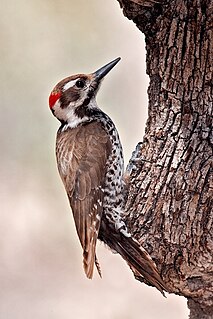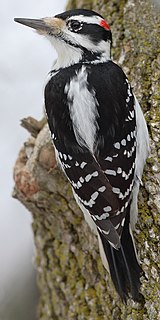 W
WLeuconotopicus is a genus of woodpeckers in the family Picidae native to North and South America.
 W
WThe Arizona woodpecker is a woodpecker native to southern Arizona and New Mexico and the Sierra Madre Occidental of western Mexico. The species northernmost range in southeastern Arizona, extreme southwestern New Mexico, and northern Sonora is the region of the Madrean Sky Islands, a region of higher Sonoran Desert mountain ranges.
 W
WThe hairy woodpecker is a medium-sized woodpecker that is found over a large area of North America. It is approximately 250 mm (9.8 in) in length with a 380 mm (15 in) wingspan. With an estimated population in 2003 of over nine million individuals, the hairy woodpecker is listed by the IUCN as a species of least concern. Some ornithologists place this species in the genus Dryobates.
 W
WThe red-cockaded woodpecker is a woodpecker endemic to the southeastern United States. Some taxonomic authorities, including the American Ornithological Society, continue to place this species in the genus Picoides.
 W
WThe smoky-brown woodpecker or brown woodpecker is a species of bird in the family Picidae. Some taxonomic authorities, including the American Ornithological Society, continue to place this species in the genus Picoides.
 W
WStrickland's woodpecker is a medium-sized species of woodpecker endemic to Mexico. The Arizona woodpecker was formerly considered the northern subspecies of this bird until the 42nd supplement of the American Ornithologists Union checklist, which officially split them into two separate species.
 W
WThe white-headed woodpecker is a non-migratory woodpecker that resides in pine forests of the mountains of western North America. It has a black body and white head. It has white primary feathers that form a crescent in flight. Males have a red spot at the back of the head. Some taxonomic authorities, including the American Ornithological Society, continue to place this species in the genus Picoides.